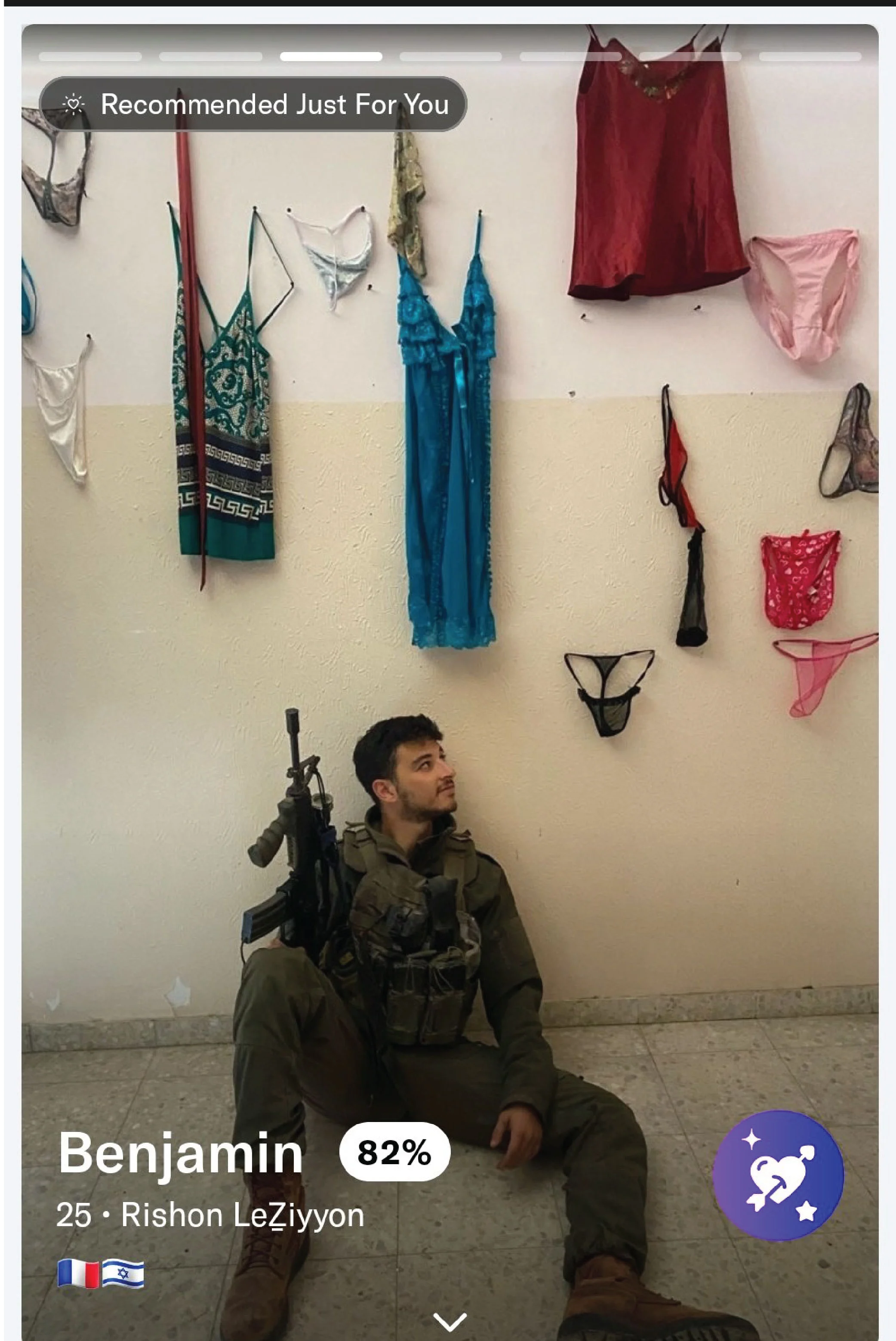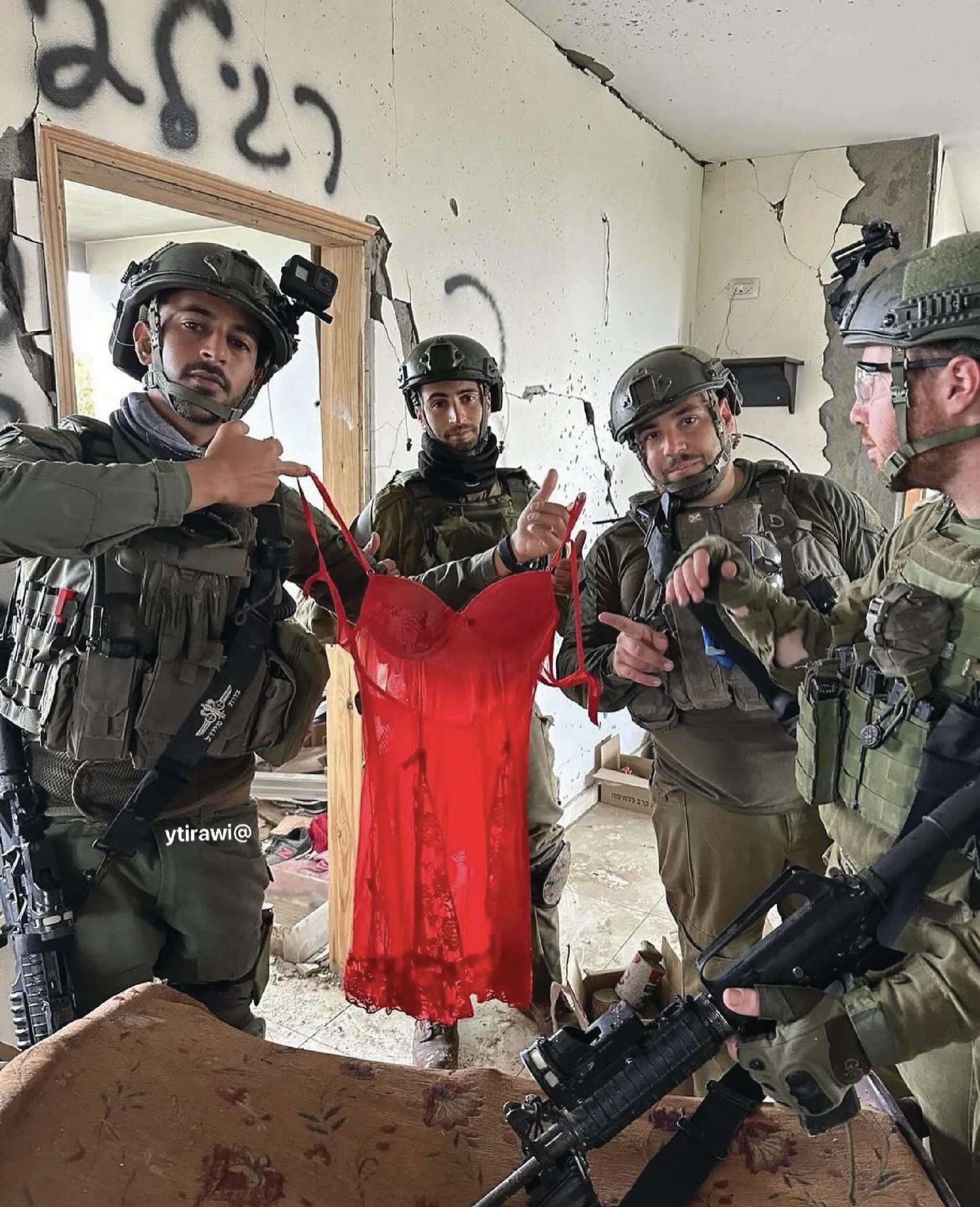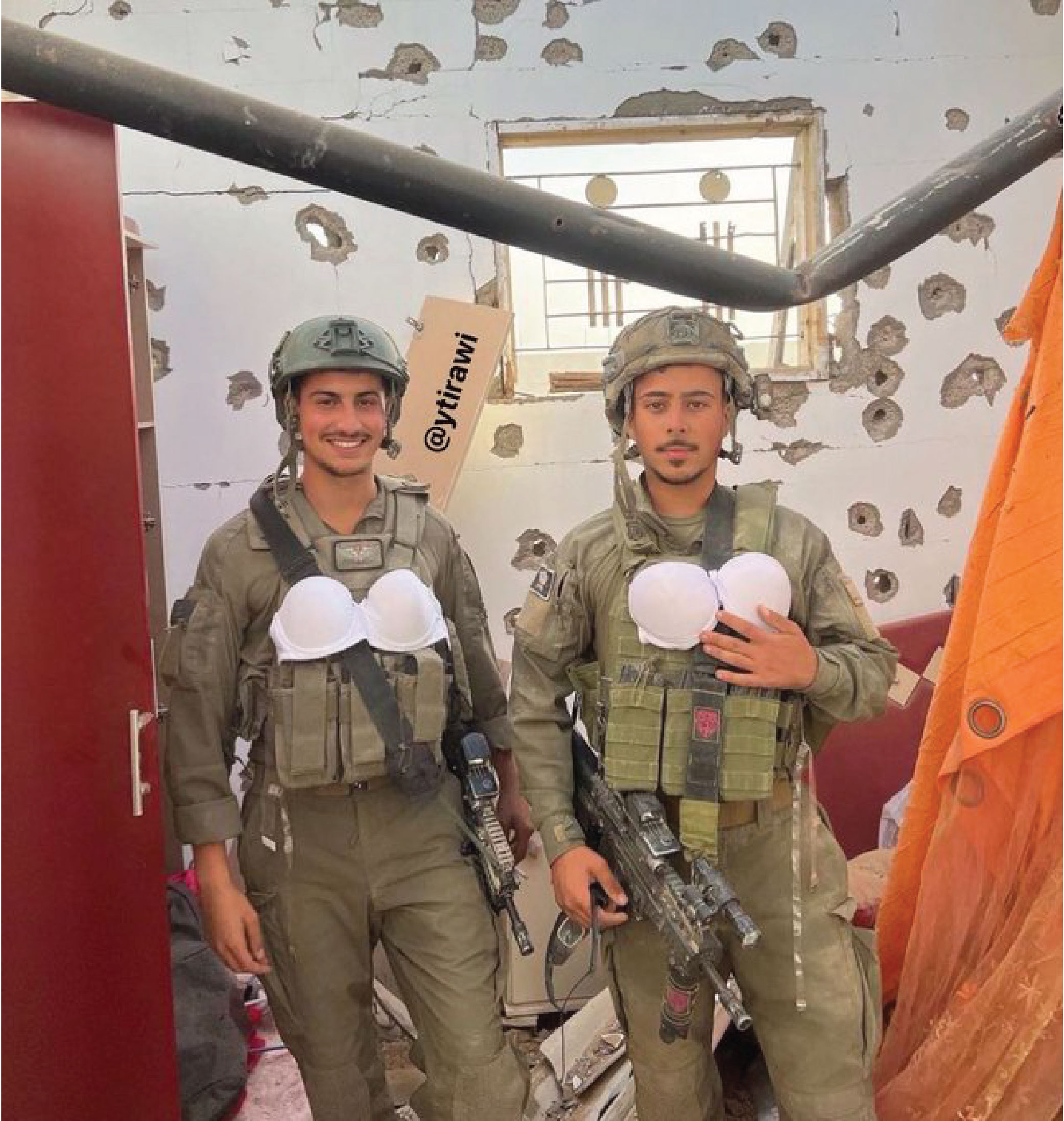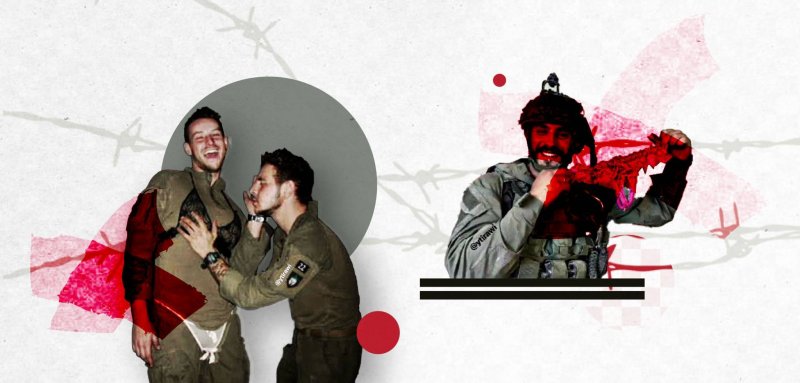In the midst of an ongoing genocide, among Gaza’s destroyed homes, with their decimated rooms and martyed or displaced owners, Israeli soldiers pose provocatively in the robes and underwear of Gazan women. They take photos and videos in this clothing, mocking them, making sexual innuendos and posting this content online.
Throughout nearly ten months of the genocide on Gaza, Israeli soldiers have routinely weaponized the image of women’s underwear by posting provocative photos and videos of themselves toying with lingerie found in Palestinian homes.
We saw a soldier sitting atop a tank, holding a mannequin doll wearing a bra, and saying sarcastically, "I found myself a beautiful wife. Started a serious relationship in Gaza—a great woman."
Another soldier posted a photo on his dating app profile, sitting next to a wall he had decorated with Gazan women's underwear.
 An Israeli soldier poses next to Gazan women’s lingerie in his profile picture on the OkCupid dating app.
An Israeli soldier poses next to Gazan women’s lingerie in his profile picture on the OkCupid dating app.
An Israeli soldier poses next to Gazan women’s lingerie in his profile picture on the OkCupid dating app.
These images depict a type of colonial, patriarchal violence used by Israeli soldiers to violate the lives of Gazans.
They violate the belongings and personal spaces of women—and women themselves—sexualizing the genocide they have been committing in the besieged strip for nearly ten months.
These images have instilled fear and apprehension amongst the Gazan women displaced from their homes. They worry that the Israeli soldiers using their homes as places of rest have either tampered with their belongings and underwear or left vulgar phrases and insults on the mirrors in their bedrooms.
These images depict a type of colonial, patriarchal violence used by Israeli soldiers to violate the lives of Gazans. They violate the belongings and personal spaces of women—and women themselves—sexualizing the genocide they have been committing in the besieged strip for nearly ten months.
Soldiers routinely violate women’s privacy
After the Israeli army withdrew from Khan Yunis, Yasmin (pseudonym) decided to return to her home to check on it. When the 27-year-old arrived, she was stunned by what she saw.
The soldiers not only destroyed parts of the house and completely vandalized its contents, but they also invaded her privacy and tampered with her personal belongings. This included the underwear in her bedroom.
"I walked home with my hand on my heart. I was afraid of stepping on landmines left by occupation soldiers to blow up the Gazans who return to their homes," Yasmin tells Raseef22.
"But I was surprised to find that my home was not the home I left behind. The soldiers had ransacked my room and went through my personal belongings. I found some of my clothes scattered on the street, and my underwear hanging over one of the windows in a mocking and humiliating manner," she adds.
Yasmin also found Hebrew writings on her bedroom mirror. She didn't understand their meaning until she translated them on Google. She found insults directed at Gazan women and their husbands, as well as obscene language and racist innuendos.
"I walked home afraid of coming across the landmines left by occupation soldiers to blow up the Gazans who return to their homes. But I was surprised to find that the soldiers had ransacked my room and went through my personal belongings. I found my clothes scattered on the street and my underwear hanging over one of the windows in a humiliating manner."
As Widad Ramzi, 40, scrolled through her social media feed, she was shocked to see an Israeli soldier wearing a traditional Palestinian dress she had bought for a special occasion.
Widad was in denial. She couldn't believe what she was seeing. She handed her phone to her daughters to confirm that the occupation soldiers were indeed wearing her dresses.
"These dresses hold great social and moral value to me. I cherish and safeguard them like a precious heirloom. We, the women of Gaza, take pride in wearing our colorful, embroidered traditional dresses," Widad tells Raseef22.
She remarks, "One of these dresses was sent to me as a gift by my sister from Jordan. I was shocked to find it on the body of an Israeli soldier."
Widad was displaced from the Shuja'iyya neighborhood in eastern Gaza. She left her home in a rush, and didn't have time to take any personal belongings with her, except the clothes she was wearing.
Widad was shocked to see an Israeli soldier on her social media feed wearing one of her traditional dresses. She handed her phone to her daughters to confirm that the occupation soldiers were indeed wearing her dresses. "These dresses hold great social and moral value to me. I cherish and safeguard them like a precious heirloom. We, the women of Gaza, take pride in wearing our colorful, embroidered traditional dresses. I was shocked to find one of these dresses on the body of an Israeli soldier.”
Like most Gazans, Widad believed she would only be displaced for a short time.
"I watch the images in shock and with a sense of helplessness. The occupation forced us out of our homes. Its soldiers then invaded our home and destroyed their contents and stole money, based on what my neighbors have informed me. According to the pictures I saw, I confirmed that they had even tampered with our bedroom and my personal clothes," Widad says.
She describes the soldiers as gangs and thieves, stating, "These soldiers treat our customs and traditions with mockery. They have stolen everything from us—our food, our heritage, our clothing—and then took it as their own."
 Israeli soldiers hold underwear inside a partially-destroyed Gazan home.
Israeli soldiers hold underwear inside a partially-destroyed Gazan home.
Israeli soldiers hold underwear inside a partially-destroyed Gazan home.
“What should women do when they return to their homes? Will they come to resent their own clothes and bedrooms? Will they imagine soldiers wearing their garments, laughing at their sickening jokes?”
What will women do when they return?
Yasmin believes the occupation knows that Palestinian society considers the privacy of Palestinian women a red line. "Therefore, what they did in my house and the homes of other Gazan women is an insult, a provocation, and revenge," she says.
Legal expert Tahani Kassem confirms that "there is great sanctity and sensitivity associated with the privacy of Palestinian women. The occupation is well aware of this," she tells Raseef22.
"Therefore, the message that the Israeli occupation wants to convey is that they can destroy your homes, violate your women, and their privacy."
These images and scenes have understandably caused significant distress among young Gazan girls and women who have been forced to leave their homes. Expressing her apprehension, Farah Majed tells Raseef22, "I wasn't surprised by the soldiers' behavior in vandalizing and wearing underwear belonging to Gazan women.” Majed, who is in her mid-thirties, continued, “But every time I come across such a picture, I fear it may have been taken in my own home and that soldiers may have toyed with my clothes."
"This does not bring me shame or embarrassment, but sheer terror at how easily these individuals can just invade our personal space and mock us for being women."
"This does not bring me shame or embarrassment, but sheer terror at how easily these individuals can just invade our personal space and mock us for being women."
“What should women do when they return to their homes? Will they come to resent their own clothes and bedrooms? Will they imagine soldiers wearing their garments, laughing at their sickening jokes?” Farah wonders aloud.
 Israeli soldiers wearing bras in a partially destroyed Gazan home.
Israeli soldiers wearing bras in a partially destroyed Gazan home.
Israeli soldiers wearing bras in a partially destroyed Gazan home.
“Eradicated and sexualised all at once"
In an op-ed titled “Why are Israeli soldiers obsessed with Gaza women's underwear?” published on International Women’s Day, British writer Nadeine Asbali draws attention to a disturbing reality unfolding amid Israel’s ethnic cleansing in Gaza: “The underwear of Palestinian women has become a symbol of how Israel’s ethnic cleansing has permeated even the innermost sanctity of private, domestic life in Gaza."
Asbali discussed the symbolism attached to Palestinian women’s underwear, adding that "the obsession of Israeli soldiers with Palestinian women’s underwear is a reminder that Muslim women’s bodies have always been metaphorically and physically intertwined with Western colonial pursuits."
She explained that such practices "cement the very truth that Israel as a state is built upon. That Palestinian women, Arab women, Muslim women, aren’t women at all. They are objects to be criminalized and fetishised in equal measure. Eradicated and sexualised all at once."
“The underwear of Palestinian women has become a symbol of how Israel’s ethnic cleansing has permeated even the innermost sanctity of private, domestic life in Gaza. [To Israel,] Palestinian women, Muslim women, and Arab women [...] are objects to be criminalized and fetishised in equal measure. Eradicated and sexualised all at once" — British writer Nadeine Asbali
?? IDF soldiers ransack homes of displaced Palestinians & fulfill sordid sexual desires with women lingerie underwear.
— ungovernable (@DieOnFeet) March 28, 2024
Complete disregard for context of situation.
These are vids taken directly from IDF social media accounts. Brazen, open for all to see. https://t.co/xGr5QFGUvM pic.twitter.com/dvVvGTO0OX
Sexualizing the genocide: A violation of international law
Legal expert Tahani Kassem argues that the violations of international law against women in Gaza are not solely confined to depriving them of their respect and violating their privacy. "The women of Gaza have endured the horrors of massacres, arrests, forced displacement, starvation, and daily humanitarian suffering," she asserts.
The photos and videos published by Israeli soldiers violate Article 27 of the Fourth Geneva Convention regarding the treatment of civilians during wartime.
This clause states that civilians, “are entitled, in all circumstances, to respect for their persons, their honor, their family rights, their religious convictions and practices, and their manners, cultural traditions and customs. They shall at all times be humanely treated, and shall be protected especially against all acts of violence or threats thereof and against insults and public curiosity.” In addition, “Women shall be especially protected against any attack on their honor.”
Feminist Activist Khuloud Jamal emphasizes that, in times of war and conflict, women have the right to protection of their privacy, customs, and dignity. She clarifies that the occupation has violated all legal standards with their heinous acts, which are part of a strategy to sexualize genocide.
Yasmin found Hebrew writing on her bedroom mirror. She didn't understand their meaning until she translated them on Google. She found insults directed at Gazan women and their husbands, as well as racist innuendos.
"It's as if the occupation soldiers are pulling the trigger on Palestinian 'honor' through their violation of women," Jamal tells Raseef22.
She concludes by noting that this, "deviant policy associated with sexualizing genocide is not new in the history of Israeli occupation. The events of the 1948 Nakba witnessed violations of women's privacy and its weaponization to displace Palestinians from their land."
In March, the United Nations called for an investigation into videos which show Israeli soldiers wearing Gazan women's underwear. During the investigation, a UN spokesperson described these scenes as, "extremely disturbing." However, the question remains: Are such statements enough to protect Gazan women from the sexual violence of the occupation during its ongoing genocide?
In women's lingerie. That's why IDF seems to be sniffing around them so much. pic.twitter.com/zoN3jENKIs
— TatlTael (@TatllTael) March 24, 2024
Raseef22 is a not for profit entity. Our focus is on quality journalism. Every contribution to the NasRaseef membership goes directly towards journalism production. We stand independent, not accepting corporate sponsorships, sponsored content or political funding.
Support our mission to keep Raseef22 available to all readers by clicking here!
Interested in writing with us? Check our pitch process here!



